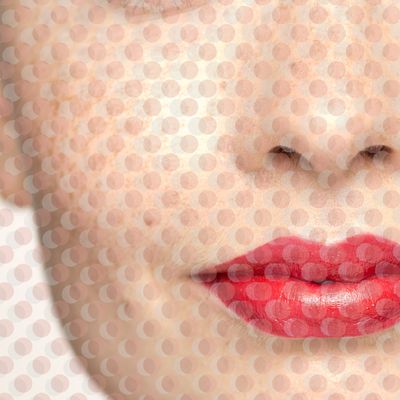
Perfection is a moving target. This week, the Cut explores the allure of trying to achieve the impossible.
Once when I was 19 years old, my mother came back from a trip to Japan with a gift for me: a small plastic container full of some milky-white liquid, which looked and smelled faintly like Elmer’s Glue. With my stunted grasp of Japanese characters, all I could read was the symbol for bright, a sun and a moon set side by side. “What is it?” I asked her, shaking the small vial. “It’s very popular right now,” she assured me. “It’ll help your freckles.” I took it into the bathroom and for the first time looked deeply, penetratingly into my face. I hadn’t thought much about freckles — skin was skin, the only things I dreaded were zits. But as I stared into the beige surface, new things shifted into view, lifted from the background like the 3-D image hidden in a Magic Eye poster: I saw light-brown spots littering the swell of cheek below my eyes, the pitted prick of pores, the faint ghostly geometry of tiny criss-crossing lines visible only in bright bathroom light, as I pressed my face up almost against the cool plane of the mirror. I was amazed at how uneven I truly was, at how long I had gone without noticing. That night I applied the brightening lotion twice, and went to sleep worrying over what I had discovered about my own alien landscape.
Lightness and brightness had always been at the center of the Asian ideal of beauty that I encountered growing up: The Mandarin word for pretty literally means “polished bright.” My mother’s Taiwanese-American relatives and friends would cup my face in their hands and tell me hen piao-liang (“very pretty” in Mandarin), a phrase that I also saw applied to vases, bracelets, and small fluffy dogs. I knew to stay out of the sun, to wear wide-brimmed hats, and to seek cover whenever possible. But this inquisition of my face, and the product solution that accompanied it, marked the first time that I had seen myself as something that had already lost its polish, something no longer in mint condition, something that now required repair. And as this idea materialized in my own self-image, I began to see it manifested all around me — I had moved from a teenage phase populated by fruit-scented soaps that promised nothing more than froth and maintenance to products that offered to change me in a wide variety of ways. There were brightening creams, dark-spot correctors, radiance lotions, and melanin blockers in the aisles of drugstores and Sephoras. There were gritty pastes that promised to slough my top layer of weary, used-up skin, and goops that would stimulate my skin to grow newer, better skin. There were magazine women whose faces were smooth like eggs, or porcelain, or marble, or any number of materials that human bodies are not made of — and no matter how close you brought their pictures to your eyes, their velvety features never disintegrated into a heap of details.
Reader, is it any surprise that I tried all of these products? Standing in the first floors of department stores, surrounded by cosmetics counters, I rubbed one thing or another onto my skin under the bland gaze of salesladies. I bought the tubes of grit and scrubbed them into my face, then went to my internet browser and Googled whether or not it was normal to feel a burning, stinging sensation afterward. For months, I diligently applied a tiny drop of clear liquid each night to a single small, dark freckle on my jaw, and then abruptly forgot to apply it for almost a year. And if you had asked me why I was doing these things or what exactly I was hoping to achieve, I wouldn’t have known what to tell you: It wasn’t that I thought my skin looked bad or was flawed, exactly. It was that I held the belief that it could look better, even though I didn’t know what that better would look like.
The trouble with perfection is that it doesn’t exist, but it can be imagined. Nothing in the world resembles the luminous, untouchable smoothness an idea can hold in the mind, and nothing in the world satisfies the desire to find that idea and touch it. Nowadays I try not to worry about my skin unless it feels itchy or otherwise alarming. I buy skin products that advertise themselves as containing lots of vitamins or plant parts, because you have to choose something and I believe that if I put lots of vitamins into my body through all different channels, some of them will make it through. I wear sunscreen most of the time, but if it’s an especially beautiful day, I skip it because I know that feeling the light on my bare skin makes me feel unjustifiably happy, like I’ve just been plugged in. And instead of wishing that my skin were pearl, or alabaster, or any of the other things that skin is not, I take interest in it for what it is: my conduit, my barrier, the part of me through which I feel the world.




